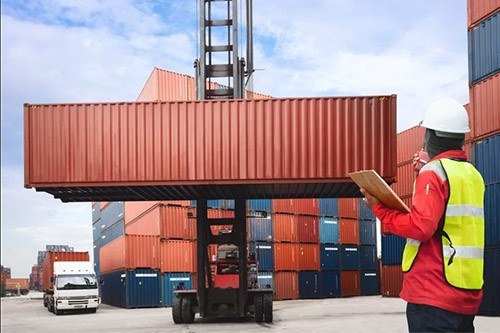Taking Advantage Of Nigeria’s $6b Top 10 Exports

In 2022, Nigeria, a Western African nation surrounded by Benin, Chad, Cameroon and Niger shipped US$63.3 billion worth of exported products around the world.
That dollar amount reflects a 19.7% uptick from $52.9 billion recorded in 2018.
Year over year, the total value of Nigerian exports accelerated by 33.1% compared to $47.6 billion in 2021.
In 2021, Nigeria ranked 30th in the world in terms of GDP (current US$), the number 52 in total exports, number 50 in total imports, number 141 economy in terms of GDP per capita (current US$), and the number 126 in the most complex economy index according to the Economic Complexity Index (ECI).
All this background information is to prepare you for the fact that Nigeria is indeed a viable export opportunity.
Nigeria’s biggest export is crude oil, a commodity that represents over three-quarters (78.7%) of its total exported goods by value. That percentage belies the relatively concentrated nature of the Nigerian portfolio of export products.
Nigeria places among the world-leading export nations that sell oil seeds, as well as being a major competitor delivering crude oil and cocoa beans to international markets.
Where Nigeria Ships the Majority of Its Exports
The latest available country-specific data shows that 72.9% of products exported from Nigeria were bought by importers in: India (12.6% of the Nigerian total), Spain (12%), Netherlands (9.6%), Indonesia (7.4%), United States of America (7%), France (5.8%), Italy (4.2%), Ivory Coast (3.4%), Canada (3%), Portugal (2.95%), Brazil (2.87%) and South Africa (2.2%).
From a continental perspective, 44% of Nigeria’s exports by value were delivered to European countries while 31.1% was sold to importers in Asia. Nigeria shipped 10.1% worth of goods to North America, and another 10% was bought by buyers in Africa.
Smaller percentages went to Latin America (4.7%) excluding Mexico but including the Caribbean, and Oceania (0.1%) Australia only.
Given Nigeria’s population of 216.7 million people, the total $63.3 billion in 2022 Nigerian exports translates to roughly $300 for every person in the West African nation. That dollar metric exceeds the average $225 per capita for 2021.
Nigeria’s Top 10 Exports
The following export product groups represent the highest dollar value in Nigerian global shipments during 2022. Also shown is the percentage share each export category represents in terms of overall exports from Nigeria.
Mineral fuels including oil: US$57.5 billion (90.7% of total exports)
Fertilizers: $1.9 billion (3%)
Ships, boats: $773.7 million (1.2%)
Cocoa: $679.8 million (1.1%)
Oil seeds: $398.2 million (0.6%)
Aluminium: $281.6 million (0.4%)
Fruits, nuts: $247.3 million (0.4%)
Gems, precious metals: $150.8 million (0.2%)
Tobacco, manufactured substitutes: $150.5 million (0.2%)
Copper: $149.4 million (0.2%)
Nigeria’s top 10 exports are highly concentrated accounting for 98.2% of the overall value of the country’s global shipments.
Gems and precious metals represent the fastest grower among the top 10 export categories, up by 1,583% from 2021 to 2022.
In second place for improving export sales were fertilizers via a 102% advance.
Nigeria’s shipments of copper posted the third-fastest gain in value, up by 100.9%.
The leading decliner among Nigeria’s top 10 export categories was the ships and boats grouping, thanks to its -46.5% year-over-year drop.
Note that the results listed above are at the categorized two-digit Harmonized Tariff System (HTS) code level.
At the more granular four-digit HTS code level, Nigeria’s most valuable exported products are crude oil (78.7% of the Nigerian total), petroleum gases (11.7%), nitrogenous fertilizers (3%), light vessels, fire boats and floating docks (1%), cocoa beans (0.9%), oil seeds (0.5%), unwrought aluminium (0.4%), cashew nuts and coconuts (also 0.4%), electrical energy (0.2%), then unwrought gold (also 0.2%).
Products Generating Greatest Trade Surpluses for Nigeria
Nigeria incurred an overall $2.9 billion trade surplus for 2022, reversing a -$4.9 billion deficit in 2021.
The following types of Nigerian product shipments represent positive net exports or a trade balance surplus. Investopedia defines net exports as the value of a country’s total exports minus the value of its total imports.
In a nutshell, net exports reflect the amount by which foreign spending on a home country’s goods or services exceeds or lags the home country’s spending on foreign goods or services.
Mineral fuels including oil: US$33.5 billion (Up by 28.2% since 2021)
Fertilizers: $1.6 billion (Up by 110%)
Ships, boats: $660.3 million (Down by -48.4%)
Cocoa: $650.7 million (Up by 6.3%)
Oil seeds: $344.1 million (Up by 8.9%)
Gems, precious metals: $147.7 million (Up by 2,483%)
Lead: $106.7 million (Up by 13.5%)
Ores, slag, ash: $105 million (Up by 65.9%)
Copper: $103.3 million (Up by 141.8%)
Fruits, nuts: $97.7 million (Down by -48.2%)
Nigeria has highly positive net exports, particularly in the international trade of crude oil and petroleum gases. In turn, these cashflows indicate Nigeria’s strong competitive advantages under the mineral fuels including the oil category.
Products Causing Worst Trade Deficits for Nigeria
Below are exports from Nigeria that result in negative net exports or product trade balance deficits. These negative net exports reveal product categories where foreign spending on home country Nigeria’s goods trail Nigerian importer spending on foreign products.
Machinery including computers: -US$6.9 billion (Down by -7.5% since 2021)
Electrical machinery, equipment: -$3.5 billion (Up by 11.7%)
Vehicles: -$3.2 billion (Down by -6%)
Cereals: -$2.27 billion (Down by -17.7%)
Plastics, plastic articles: -$2.26 billion (Down by -9.3%)
Optical, technical, and medical apparatus: -$1.2 billion (Up by 10.2%)
Pharmaceuticals: -$1.1 billion (Down by -23%)
Organic chemicals: -$1.02 billion (Up by 27.6%)
Other chemical goods: -$1.01 billion (Up by 8.9%)
Articles of iron or steel: -$979.6 million (Down by -15%)
Nigeria has highly negative net exports and therefore deep international trade deficits under the machinery including computers category.
From the foregoing, would-be exporters can make informed decisions on areas to focus on to tap into the huge potential of Nigeria’s export industry.
And in the words of Muda Yusuf, the Founder, Centre for the Promotion of Private Enterprise (CPPE) and the immediate past Director General of the Lagos Chamber of Commerce and Industry (LCCI), “It’s a lot of money now to export. A dollar that gives you N450 before will now give you N800. And there’s no more barrier like that on how you can sell your foreign exchange.
Now you can bring it in, you can sell it anywhere. You can sell it at the I&E Window. So, the incentive is there”.








